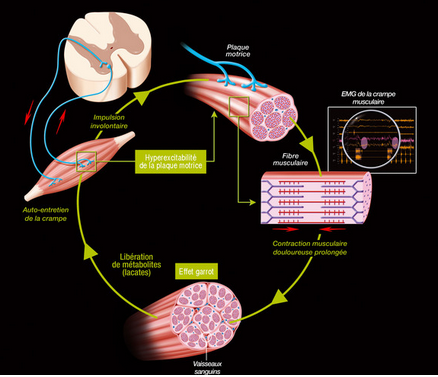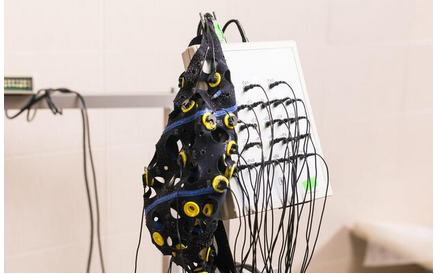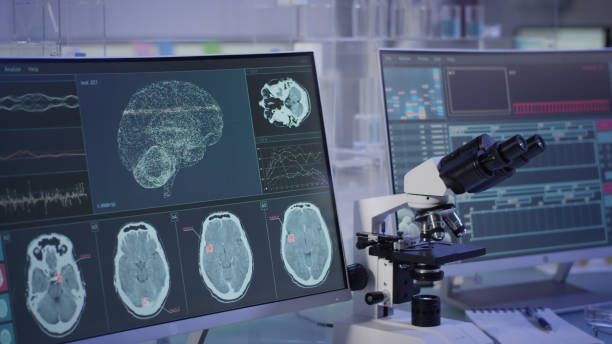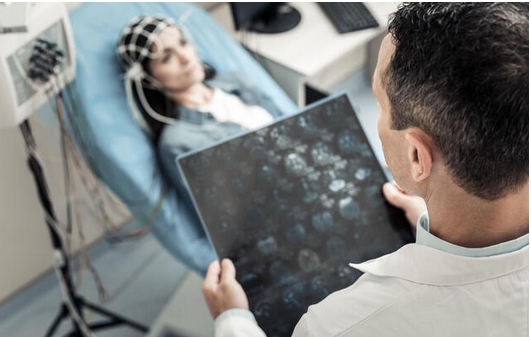Our Services
Electroencephalogram (EEG)





EEG BRAIN ACTIVITY
An electroencephalogram (EEG) is a test that detects electrical activity in your brain using small, metal discs (electrodes) attached to your scalp. Your brain cells communicate via electrical impulses and are active all the time, even when you’re asleep. This activity shows up as wavy lines on an EEG recording. An EEG is one of the main diagnostic tests for epilepsy. EEG is a test that detects abnormalities in your brain waves, or in the electrical activity of your brain. During the procedure, electrodes consisting of small metal discs with thin wires are pasted onto your scalp. The electrodes detect tiny electrical charges that result from the activity of your brain cells. The charges are amplified and appear as a graph on a computer screen, or as a recording that may be printed out on paper.
Why it’s done
An EEG can determine changes in brain activity that might be useful in diagnosing brain disorders, especially epilepsy or any other seizure disorder. The EEG is used to evaluate several types of brain disorders. When epilepsy is present, seizure activity will appear as rapid spiking waves on the EEG. People with lesions of their brain, which can result from tumors or stroke, may have unusually slow EEG waves, depending on the size and the location of the lesion. The test can also be used to diagnose other disorders that influence brain activity, such as Alzheimer’s disease, certain psychoses, and a sleep disorder called narcolepsy. The EEG may also be used to determine the overall electrical activity of the brain (for example, to evaluate trauma, drug intoxication, or extent of brain damage in comatose patients). The EEG may also be used to monitor blood flow in the brain during surgical procedures.
Types of EEG
An EEG might also be helpful for diagnosing or treating the following disorders and different EEG have different recording timelines than others:
- Routine EEG: Routine EEG scans take 45 minutes. Your EEG technologist may ask you to breathe differently or look at flashing lights during the procedure. This is usually the standard for all patients before graduating
- Prolonged EEG: A prolonged EEG test usually takes one hour and 30 minutes, but some types can last several days. A prolonged EEG gives your healthcare provider more information than a routine EEG. Your provider may use a prolonged EEG test to diagnose or manage seizures disorders. Prolonged EEGs use video.
- Ambulatory EEG: Ambulatory EEGs last one to three days. Ambulatory EEGs take place at home or at an EEG monitoring unit. During an ambulatory EEG, electrodes connect to a small EEG recorder. You can do most of your daily activities while the machine tracks your brain activity. You or family member can press a button if you have a seizure or event that your healthcare provider is trying to capture.
- Video EEG: The technician makes a video recording of you during your EEG. Video recording helps your healthcare provider see and hear what you’re doing when you have a seizure or other brain event. Your provider may also call this test EEG monitoring, EEG telemetry or video EEG monitoring.
- Sleep EEG: A technician performs an EEG test while you sleep. Healthcare providers may order sleep EEGs if a routine EEG doesn’t offer enough information. You might have a sleep study to test for sleep disorders with a sleep disorders center.
When will I get my EEG results?
You will find out the results of your EEG at a follow-up appointment. Your healthcare provider will explain your EEG results to you.
What do the EEG results mean?
Your healthcare provider will review the brain wave patterns that your EEG identified. The test results describe patterns as normal or abnormal.
Abnormal patterns have different causes, such as:
- Alcoholism or substance use disorders (drug abuse).
- Bleeding in the brain.
- Brain swelling (edema).
- Brain tumor.
- Head injury.
- Migraines.
- Seizure disorder like epilepsy.
- Sleep disorder, such as sleep apnea or narcolepsy.
- Stroke.
What happens if I have an abnormal EEG reading?
Your healthcare provider may refer you to a specialist, like a neurologist. A specialist can diagnose, treat or manage your condition.
An EEG (electroencephalogram) is a safe, painless test that measures brain activity. An EEG can help your healthcare provider learn the cause of symptoms like seizures, confusion or memory loss. With a diagnosis, your provider can treat and manage a brain-related condition appropriately.
Address
Doctors Park Building, 5th Floor, Wing A, Nairobi
Call Us
0726 759429 / 0722 517582
Email Us
info@neurophysiologyservices.co.ke / neurophysiology2017@gmail.com
